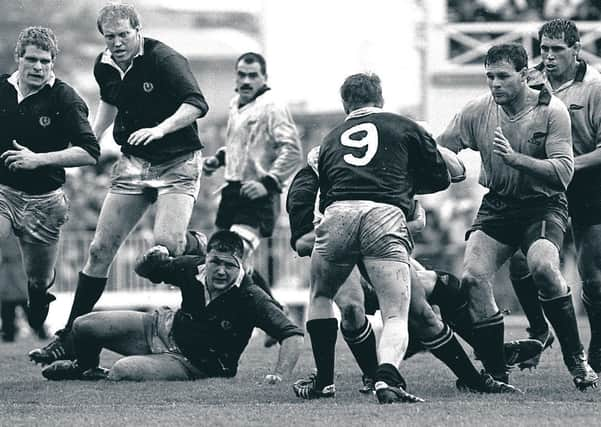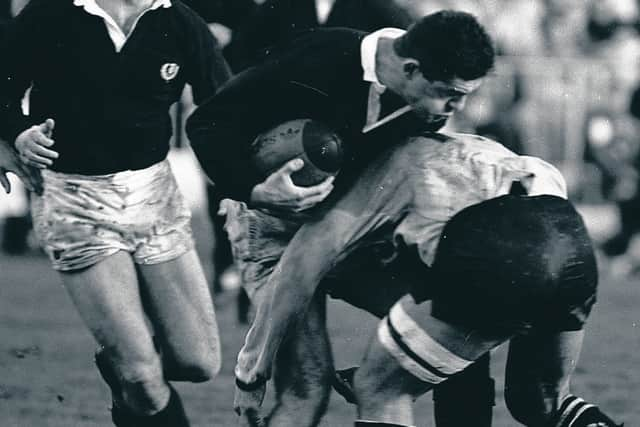The day Scotland gave the mighty All Blacks a fright in their own back yard


Two of the great Holy Grails in Scottish sport are for one of our two major national teams to beat the generally acknowledged world leaders in their field of play.
Scotland’s football team have never beaten Brazil and our rugby boys have never beaten the mighty All Blacks.
Advertisement
Hide AdAdvertisement
Hide AdBilly Bremner came within a hair’s breadth at the 1974 World Cup in West Germany and the oval-ball men in dark blue have had a few close shaves with New Zealand down the years, including a 0-0 stalemate in 1964 and a more entertaining 25-25 draw in 1983, both at Murrayfield.
Stuart Hogg’s thrilling dash in the last minutes in November 2017 on that emotionally-charged “Doddie Weir Match” tantalised us with a moment of history but was not to be as the then world champions held on for a 21-17 win.
The two nations have met 31 times since 1905 (0-2-29). A 32nd due for Dunedin in July, which would have been the Scots’ first tour match in the land of the long white cloud in 20 years, will almost certainly be canned due to the current crisis.
The All Blacks are due back at Murrayfield in November, though in the state of flux we find ourselves in, that diary date is now reduced from ink to pencil. There has been much made of the 30th anniversary of that never-to-be-forgotten Grand Slam, and while the glory of that 17 March day would be hard to eclipse in the Scottish rugby psyche, a few months later the bulk of that same team of heroes came within a whisker of what, in pure rugby terms, would have been an even greater feat.
Perhaps the greatest “one that got away” against the All Blacks came on the summer tour, back when they were proper tours, on which the titans departed this month three decades ago.


If that triumph over Will Carling’s heavily-fancied English favourites in the Grand Slam-Five Nations-Calcutta Cup decider, thanks to Tony Stanger’s famous winning try, had been viewed as a one-off, the squad were to show their true world class in the game’s eternal toughest finishing school and came so close to toppling the then inaugural world champions in their hallowed Eden Park backyard in Auckland.
“It was a great trip,” recalled Grand Slam hero Tukalo, although it turned out to be not the best for him on the field.
The bare stats are that Scotland played eight games, winning five and drawing one of the “midweek” provincial games. It was the first time they had ever gone unbeaten outside Tests on a southern hemisphere tour.
Advertisement
Hide AdAdvertisement
Hide AdIt all started with a routine 45-0 win over Poverty Bay in Gisborne on 30 May before a tough 16-16 draw with Wellington just a few days later.
The Scottish tourists continued an impressive march through the provincial games before beating Southland 45-12 in Invercargill on the Wednesday before the first Test in Dunedin.
“I badly injured my finger in that game but was selected for the Test match,” recalled Tukalo. “The truth is I shouldn’t have gone on that tour. It had been a long season and with all the emotion of the Grand Slam and stuff I was absolutely burned out.
“I still got picked but I felt a yard off the pace, had a dodgy finger and, to be honest, played like a clown in that first Test.”
The All Blacks, playing in their traditional change white jersey of course, beat the Scots 31-16 at the Carisbrook “House of Pain” and Tukalo knew the writing was on the wall. He played in the last midweek game – a 19-4 win over Manawatu – in Palmerston but was dropped for the second and final Test at the sacred Eden Park.
In stepped Alex Moore, the wing born in Ipswich, Queensland, (same neck of the woods as current Scotland centre Sam Johnson) who was a star of the sevens with Gala and then with Edinburgh Accies. He would win a memorable first of five caps that day on 23 June 1990, which would be the great Finlay Calder’s 28th and final cap.
“It’s never nice to be dropped and be sitting watching on but I knew in myself it was the right call and I was delighted for Alex,” said Tukalo. “It turned out to be a brilliant game and the boys played out of their skins. Of course, you want to be out there with them but that afternoon I was back to be being a supporter and willing them on. I recharged after and was back to full steam for the World Cup year in 1991.”
David Sole’s men were leading 18-12 at half-time, with tries from Stanger and that man Moore, both converted by full-back Gavin Hastings, who added two penalties. The long wait for victory seemed within touching distance.
Advertisement
Hide AdAdvertisement
Hide AdBut Grant Fox, who had kicked the Scots to oblivion in Christchurch during the World Cup quarter-final in Christchurch three years previous, was at his best again, kicking six from six. The match-levelling one was controversial as Gavin Hastings slipped fielding a Kieran Crowley punt, and was tackled by Mike Brewer, the flanker, who was clearly offside. Hastings was penalised by Welsh referee Derek Bevan for not releasing, Fox levelled the scores and added the winning points with ten minutes remaining.
Afterwards, All Blacks captain Buck Shelford, the No 8, handed the Scots, who had outscored them two tries to one, the ultimate compliment by saying it was the toughest Test they had played on home soil for many a year and admitted they had been fortunate to win.
Another piece of trivia is that, back in the days when replacements were only used for genuine injures, and with someone like Gary Armstrong you knew it must have been, the great former Hawick scrum-half Greig Oliver won off the bench the second of what would only be three caps. In the modern age he would surely have been a 50-plus man. Coincidentally, his two from the start both came against Zimbabwe, in the 1987 and 1991 World Cups.
The 1990 Grand Slam was the great moment of the Scotland rugby team, but the New Zealand tour that followed was when they backed it up and proved their mettle. As so often in Scottish sport it ended as “so near and yet so far” story. But there’s always next time.
•A message from the Editor:
Thank you for reading this story on our website. While I have your attention, I also have an important request to make of you.
With the coronavirus lockdown having a major impact on many of our advertisers - and consequently the revenue we receive - we are more reliant than ever on you taking out a digital subscription.
Subscribe to scotsman.com and enjoy unlimited access to Scottish news and information online and on our app. With a digital subscription, you can read more than 5 articles, see fewer ads, enjoy faster load times, and get access to exclusive newsletters and content. Visit https://www.scotsman.com/subscriptions now to sign up.
Our journalism costs money and we rely on advertising, print and digital revenues to help to support them. By supporting us, we are able to support you in providing trusted, fact-checked content for this website.
Joy Yates
Editorial Director
Comments
Want to join the conversation? Please or to comment on this article.